- Zacchia M, Abategiovanni ML, Stratigis S, Capasso G. Potassium: From Physiology to Clinical Implications. Kidney Dis (Basel). 2016;2(2):72-79.
- Nishi SK, Babio N, Paz-Graniel I, et al. Water intake, hydration status and 2-year changes in cognitive performance: a prospective cohort study. BMC Med. 2023;21(1):82.
- Haghighatdoost F, Feizi A, Esmaillzadeh A, et al. Drinking plain water is associated with decreased risk of depression and anxiety in adults: Results from a large cross-sectional study. World J Psychiatry. 2018;8(3):88-96.
- Santulli G, Kansakar U, Varzideh F, Mone P, Jankauskas SS, Lombardi A. Functional Role of Taurine in Aging and Cardiovascular Health: An Updated Overview. Nutrients. 2023;15(19):4236.
- Aburto NJ, Hanson S, Gutierrez H, Hooper L, Elliott P, Cappuccio FP. Effect of increased potassium intake on cardiovascular risk factors and disease: systematic review and meta-analyses. BMJ. 2013;346:f1378.
- Cairns SP. Potassium effects on skeletal muscle contraction: are potassium-metabolic interactions required for fatigue?. Eur J Appl Physiol. 2023;123(11):2341-2343.
- Swat M, Rybicka I, Gliszczyńska-Świgło A. Characterization of Fulvic Acid Beverages by Mineral Profile and Antioxidant Capacity. Foods. 2019;8(12):605.
- Singh P, Gollapalli K, Mangiola S, et al. Taurine deficiency as a driver of aging. Science. 2023;380(6649):eabn9257.
- Buford TW, Kreider RB, Stout JR, et al. International Society of Sports Nutrition position stand: creatine supplementation and exercise. J Int Soc Sports Nutr. 2007;4:6.
- Qian W, Li M, Yu L, Tian F, Zhao J, Zhai Q. Effects of Taurine on Gut Microbiota Homeostasis: An Evaluation Based on Two Models of Gut Dysbiosis. Biomedicines. 2023;11(4):1048.
- Jong CJ, Sandal P, Schaffer SW. The Role of Taurine in Mitochondria Health: More Than Just an Antioxidant. Molecules. 2021;26(16):4913.
- Dmitrieva NI, Gagarin A, Liu D, Wu CO, Boehm M. Middle-age high normal serum sodium as a risk factor for accelerated biological aging, chronic diseases, and premature mortality. EBioMedicine. 2023;87:104404.
- Li S, Xiao X, Zhang X. Hydration Status in Older Adults: Current Knowledge and Future Challenges. Nutrients. 2023;15(11):2609.
- Kenney EL, Long MW, Cradock AL, Gortmaker SL. Prevalence of Inadequate Hydration Among US Children and Disparities by Gender and Race/Ethnicity: National Health and Nutrition Examination Survey, 2009-2012. Am J Public Health. 2015;105(8):e113-e118.
- Armstrong LE, Ganio MS, Casa DJ, et al. Mild dehydration affects mood in healthy young women. J Nutr. 2012;142(2):382-388.
- Pross N, Demazières A, Girard N, et al. Influence of progressive fluid restriction on mood and physiological markers of dehydration in women. Br J Nutr. 2013;109(2):313-321.
- Carlton A, Orr RM. The effects of fluid loss on physical performance: A critical review. Journal of Sport and Health Science. 2015;4(4):357-363.
- Ganio MS, Armstrong LE, Casa DJ, et al. Mild dehydration impairs cognitive performance and mood of men. Br J Nutr. 2011;106(10):1535-1543.
- Arca KN, Halker Singh RB. Dehydration and Headache. Curr Pain Headache Rep. 2021;25(8):56. Published 2021 Jul 15.
- Spigt MG, Kuijper EC, Schayck CP, et al. Increasing the daily water intake for the prophylactic treatment of headache: a pilot trial. Eur J Neurol. 2005;12(9):715-718.
- Palma L, Marques LT, Bujan J, Rodrigues LM. Dietary water affects human skin hydration and biomechanics. Clin Cosmet Investig Dermatol. 2015;8:413-421.
- Adan A. Cognitive performance and dehydration. J Am Coll Nutr. 2012;31(2):71-78.
- National Research Council (US) Subcommittee on the Tenth Edition of the Recommended Dietary Allowances. Recommended Dietary Allowances: 10th Edition. Washington (DC): National Academies Press (US); 1989. 11, Water and Electrolytes.
- Kowey PR. The Role of Potassium. Women’s Health and Menopause. In: Lobo, R.A., Crosignani, P.G., Paoletti, R., Bruschi, F. (eds). Medical Science Symposia Series, vol 17. Springer, Boston, MA.
- Kong SH, Kim JH, Hong AR, Lee JH, Kim SW, Shin CS. Dietary potassium intake is beneficial to bone health in a low calcium intake population: the Korean National Health and Nutrition Examination Survey (KNHANES) (2008-2011). Osteoporos Int. 2017;28(5):1577-1585.
- Barcelo P, Wuhl O, Servitge E, Rousaud A, Pak CY. Randomized double-blind study of potassium citrate in idiopathic hypocitraturic calcium nephrolithiasis. J Urol. 1993;150(6):1761-1764.
- Yang Q, Liu T, Kuklina EV, et al. Sodium and potassium intake and mortality among US adults: prospective data from the Third National Health and Nutrition Examination Survey. Arch Intern Med. 2011;171(13):1183-1191.
- McCarty MF. Acid-base balance may influence risk for insulin resistance syndrome by modulating cortisol output. Med Hypotheses. 2005;64(2):380-384.
- Caciano SL, Inman CL, Gockel-Blessing EE, Weiss EP. Effects of dietary Acid load on exercise metabolism and anaerobic exercise performance. J Sports Sci Med. 2015;14(2):364-371.
- Senewiratne NL, Woodall A, Can AS. Sodium Bicarbonate. [Updated 2023 Mar 11]. In: StatPearls [Internet]. Treasure Island (FL): StatPearls Publishing; 2023 Jan-.
- Green DA. The use of grocery store baking soda for chronic metabolic acidosis in a resource-poor setting. Clin Pediatr (Phila). 2011;50(4):375.
- Grgic J, Pedisic Z, Saunders B, et al. International Society of Sports Nutrition position stand: sodium bicarbonate and exercise performance. J Int Soc Sports Nutr. 2021;18(1):61.
- Dawson-Hughes B, Harris SS, Ceglia L. Alkaline diets favor lean tissue mass in older adults. Am J Clin Nutr. 2008;87(3):662-665.
- Imenez Silva PH, Mohebbi N. Kidney metabolism and acid-base control: back to the basics. Pflugers Arch. 2022;474(8):919-934.
- Demigné C, Sabboh H, Rémésy C, Meneton P. Protective effects of high dietary potassium: nutritional and metabolic aspects. J Nutr. 2004;134(11):2903-2906.
- Sellmeyer DE, Schloetter M, Sebastian A. Potassium citrate prevents increased urine calcium excretion and bone resorption induced by a high sodium chloride diet. J Clin Endocrinol Metab. 2002;87(5):2008-2012.
- Trachtman H, Barbour R, Sturman JA, Finberg L. Taurine and osmoregulation: taurine is a cerebral osmoprotective molecule in chronic hypernatremic dehydration. Pediatr Res. 1988;23(1):35-39.
- Schaffer SW, Jong CJ, Ramila KC, Azuma J. Physiological roles of taurine in heart and muscle. J Biomed Sci. 2010;17 Suppl 1(Suppl 1):S2. Published 2010 Aug 24.
- Kim HY, Kim HV, Yoon JH, et al. Taurine in drinking water recovers learning and memory in the adult APP/PS1 mouse model of Alzheimer’s disease. Sci Rep. 2014;4:7467.
- Singh P, Gollapalli K, Mangiola S, et al. Taurine deficiency as a driver of aging. Science. 2023;380(6649):eabn9257.
- Sheikh A, Iqbal M. Taurine as a potential anti-ageing therapy: the key to reversing the ageing process? Short communication. Ann Med Surg (Lond). 2023;85(7):3759-3760.
- Yoshimura T, Manabe C, Inokuchi Y, Mutou C, Nagahama T, Murakami S. Protective effect of taurine on UVB-induced skin aging in hairless mice. Biomed Pharmacother. 2021;141:111898.
- Wen C, Guo Q, Wang W, et al. Taurine Alleviates Intestinal Injury by Mediating Tight Junction Barriers in Diquat-Challenged Piglet Models. Front Physiol. 2020;11:449.
- Qian W, Li M, Yu L, Tian F, Zhao J, Zhai Q. Effects of Taurine on Gut Microbiota Homeostasis: An Evaluation Based on Two Models of Gut Dysbiosis. Biomedicines. 2023;11(4):1048.
- Duszka K. Versatile Triad Alliance: Bile Acid, Taurine and Microbiota. Cells. 2022;11(15):2337.
- Buford TW, Kreider RB, Stout JR, et al. International Society of Sports Nutrition position stand: creatine supplementation and exercise. J Int Soc Sports Nutr. 2007;4:6.
- Sobolewski EJ, Thompson BJ, Smith AE, Ryan ED. The Physiological Effects of Creatine Supplementation on Hydration: A Review. American Journal of Lifestyle Medicine. 2011;5(4):320-327.
- Candow DG, Forbes SC, Chilibeck PD, Cornish SM, Antonio J, Kreider RB. Effectiveness of Creatine Supplementation on Aging Muscle and Bone: Focus on Falls Prevention and Inflammation. J Clin Med. 2019;8(4):488.
- Smith RN, Agharkar AS, Gonzales EB. A review of creatine supplementation in age-related diseases: more than a supplement for athletes. F1000Res. 2014;3:222.
- Winkler J, Ghosh S. Therapeutic Potential of Fulvic Acid in Chronic Inflammatory Diseases and Diabetes. J Diabetes Res. 2018;2018:5391014.
- Heil DP. Acid-base balance and hydration status following consumption of mineral-based alkaline bottled water. J Int Soc Sports Nutr. 2010;7:29.
- Siegler JC, Carr AJ, Jardine WT, et al. The Hyperhydration Potential of Sodium Bicarbonate and Sodium Citrate. Int J Sport Nutr Exerc Metab. 2022;32(2):74-81.
- Convertino VA. Blood volume: its adaptation to endurance training. Med Sci Sports Exerc. 1991;23(12):1338-1348.
- Chycki J, Kurylas A, Maszczyk A, Golas A, Zajac A. Alkaline water improves exercise-induced metabolic acidosis and enhances anaerobic exercise performance in combat sport athletes. PLoS One. 2018;13(11):e0205708.
- Chycki J, Kostrzewa M, Maszczyk A, Zajac A. Chronic Ingestion of Bicarbonate-Rich Water Improves Anaerobic Performance in Hypohydrated Elite Judo Athletes: A Pilot Study. Int J Environ Res Public Health. 2021;18(9):4948.
- Steffl M, Kinkorova I, Talar K, et al. The Effects of High Mineral Alkaline Water Consumed Over Three Consecutive Days on Reaction Time Following Anaerobic Exercise – A Randomized Placebo-Controlled Crossover Pilot Study. J Hum Kinet. 2021;78:111-119.
- Westerblad H, Allen DG, Lännergren J. Muscle fatigue: lactic acid or inorganic phosphate the major cause?. News Physiol Sci. 2002;17:17-21.
Human Optimization Is The Expanded Brand Of The Energy Blueprint
Hydration Is A Major Key To Longevity
Hydration isn’t simply a matter of drinking more fluids. It’s a cellular process, but most electrolyte formulas don’t perform at the cellular level. It turns out that hydration – true, cellular hydration – is a major key to health and longevity. Even slight dehydration can cause moodiness, problems concentrating, headaches, and fatigue. Benefit from Supercharged Cellular Hydration.
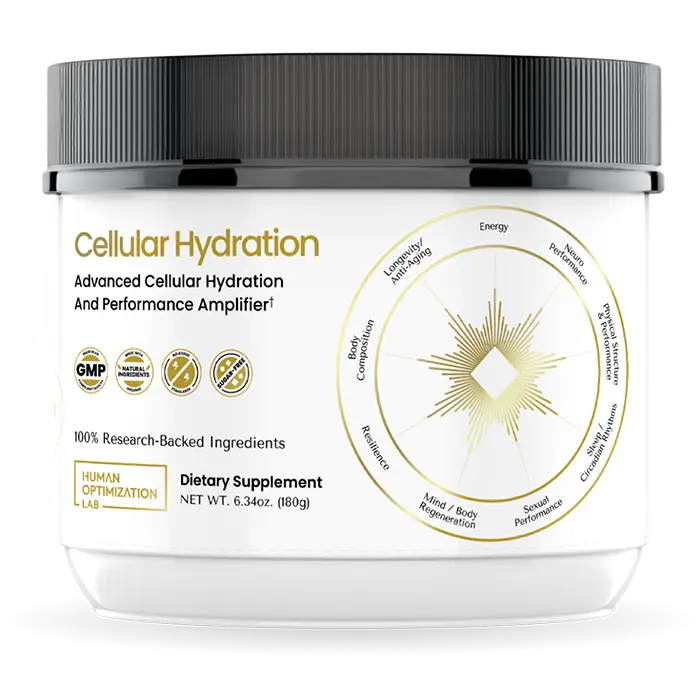
The hidden, evidence-based answer to a longer, healthier life? Optimal Cellular Hydration

Hydration is much more important than you realize… it's the unlikely key to a LONGER LIFE
Research tells us that hydration equals optimal energy, mood, cognition, and skin health.
But one surprising benefit you may not know—hydration equals a longer, more vibrant life.
Introducing Cellular Hydration.
An advanced cellular-level hydration formula that supports energy, brain health, physical performance, and longevity.
The Science-Backed Benefits of Cellular Hydration
Cellular hydration isn’t just wellness lingo…it’s backed by science
Hydration at the cellular level has been connected with:
- Increased energy at the cellular level [1]
- Boosted brain function [2]
- Better mental health and mood [3]
- Enhanced heart and vascular health [4, 5]
- Superior muscle performance [6]
- Deep nourishment from over 70 naturally-derived trace minerals [7]
- Accelerated anti-aging [8]
- Exercise performance enhancement [9]
- Positive changes to gut health and your good bacteria [10]
- Improved mitochondrial function [11]
- And a longer, healthier life! [12]
The Longevity-Hydration Link
New research shows hydration is a powerful key to “slow down aging and prolong a disease-free life.”
What if there was a magic elixir that could lower your risk of chronic disease and dying early…
Would you drink it?
A drink you could sip on every day that would…
Lower your risk of disease
Give you more energy
Better performance
Better mood and brain function
And slow down the aging process
It turns out that hydration – true, cellular hydration – is a major key to health and longevity.
With Hydrate, you can create cellular hydration and all the benefits it provides in mere seconds.
According to New Research… Staying Well-Hydrated Is Closely Linked to Longevity
According to a National Institutes of Health study published in 2023, “Adults who stay well-hydrated appear to be healthier, develop fewer chronic conditions, such as heart and lung disease, and live longer than those who may not get sufficient fluids” [12].
The study analyzed data from 11,255 adults over a 30-year period for links between hydration status and health conditions.
They found something remarkable: Adults with low hydration status had a whopping 64% higher risk of developing heart failure, stroke, atrial fibrillation, peripheral artery disease, chronic lung disease, diabetes, dementia and other diseases.
They found that those with poor hydration status had poorer lung function, more inflammation, and poorer metabolic and cardiovascular health. They even found that hydration status was an indicator of aging faster biologically than chronologically!
“The results suggest that proper hydration may slow down aging and prolong a disease-free life.”
– Natalia Dmitrieva, Ph.D., a study author and researcher in the Laboratory of Cardiovascular Regenerative Medicine at the National Heart, Lung, and Blood Institute, part of NIH
Poor Hydration is Rampant
Optimal hydration isn’t just for athletes sweating a lot or after the sauna.
The research is clear: Hydration leads to a long life & healthy aging and is important for EVERYONE.
As we age, our ability to sense thirst decreases. Paired with changes in our body’s water and sodium balance, adults tend to become dehydrated.


Electrolytes aren’t just for athletes. They’re for people who want a long, healthy life
Large-scale research shows that roughly 1 in 3 older adults is dehydrated, and a much larger percentage may have more subtle issues of poor hydration that don’t qualify as full-blown “dehydration.” [13]
Not only that, younger and younger populations are suffering from the negative effects of dehydration: In the United States, over 50% of children between the ages of 6 to 19 are dehydrated. [14]
Hydrate is safe, supportive, and, according to science, needed by people of every age.
Did You Know Hydration Is A Spectrum?
Dehydration doesn’t have to be severe to cause serious problems.
One recent study found that even slight dehydration can cause moodiness, problems concentrating, headaches, and fatigue.
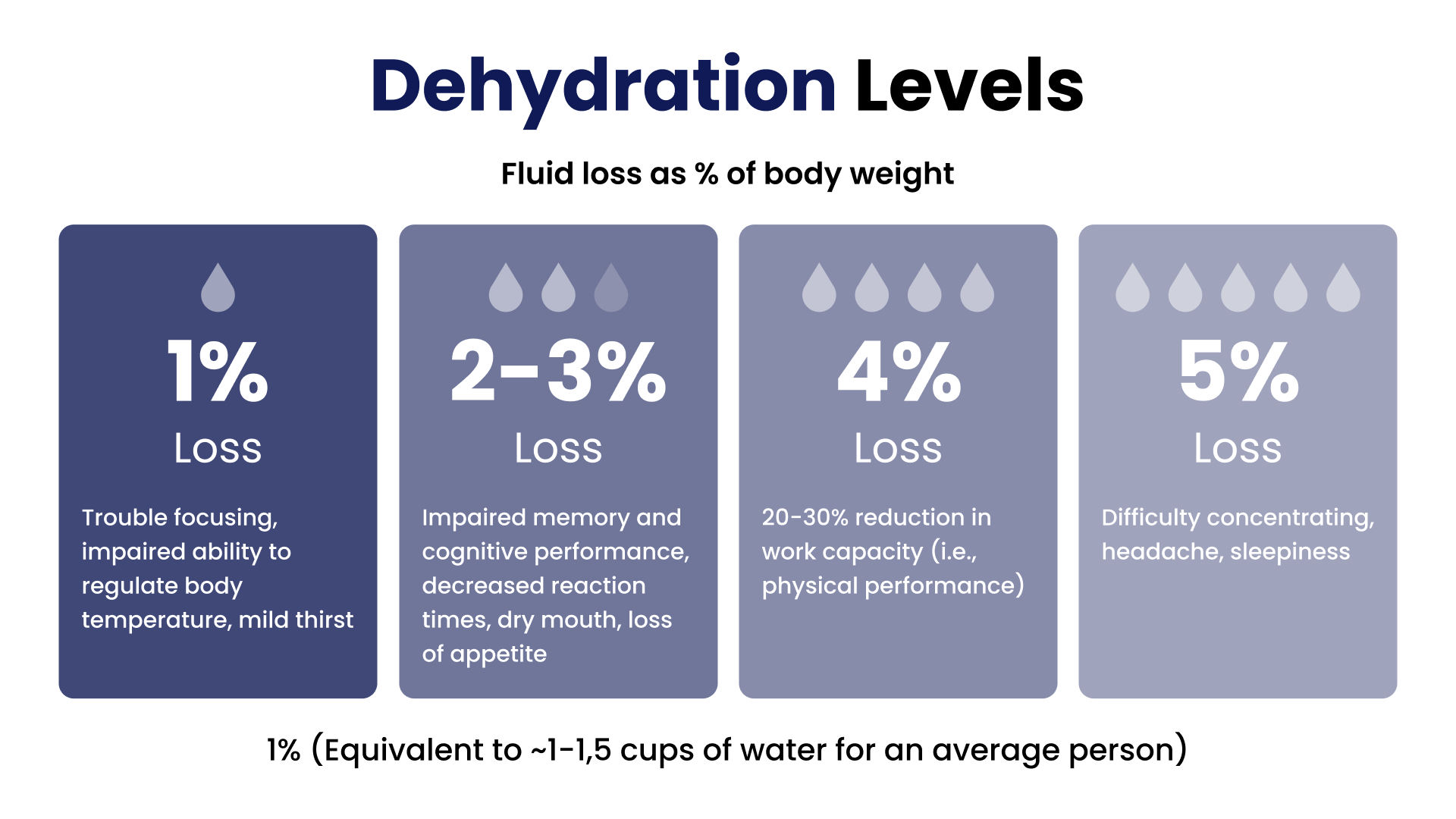
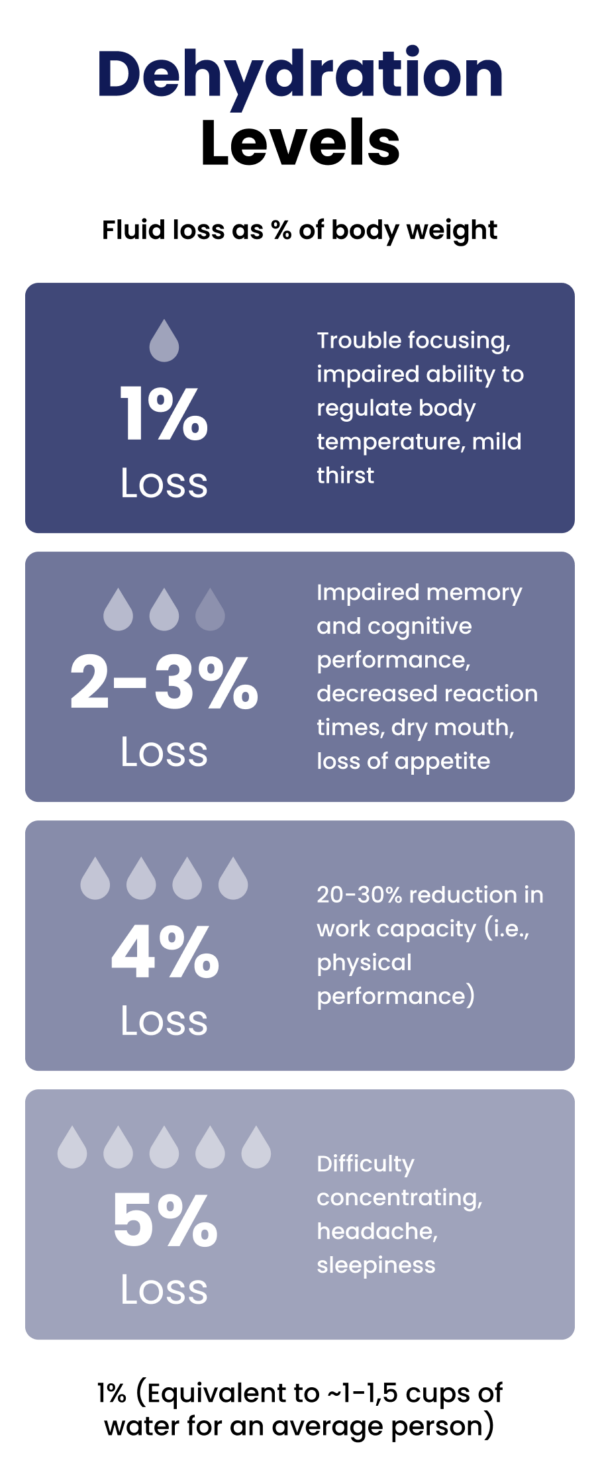
According to Harris Lieberman, one of the study's authors, "These are the levels of dehydration that would be more relevant to our daily lives" [15].
Just 2% dehydration can lead to symptoms like:
- Energy loss & fatigue [16]
- Low-quality sleep [16]
- Poor physical performance & muscle cramps [17]
- Moodiness [15, 18]
- Headaches [19, 20]
- Dry skin and altered skin barrier [21]
- Confusion and cognitive decline [16, 22]
Did you know that you can assess your hydration levels by looking at your urine?
Drinking Enough Water
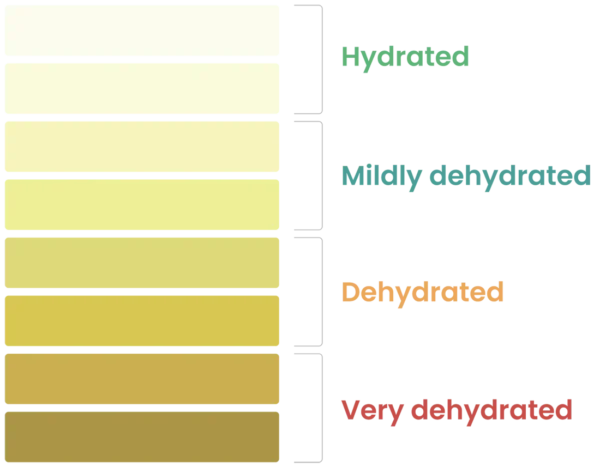
HYDRATED: Clear, odorless, and ample urine is often a sign that your body is adequately hydrated. It is important to continue consuming fluids at the same rate.
MILDLY DEHYDRATED: If your urine appears to be a slightly darker shade of yellow, it may be a sign that your body needs more hydration.
DEHYDRATED: If your urine has a medium-dark yellow color, it is a likely sign of dehydration.
VERY DEHYDRATED: If you notice that your urine appears darker and has a strong odor, it could be an indication of dehydration.
Is there such a thing as “longevity water”?
What if you could go way beyond plain water and massively improve the hydrating ability of the water you drink each day?
Cellular Hydration’s Ingredients Support Longevity Better Than Any Other Formula
Hydration isn’t simply a matter of drinking more fluids. It’s a cellular process.
But most electrolyte formulas don’t perform at the cellular level.
Hydrate is much more than electrolytes—it’s cellular hydration with every sip.
Potassium A Cellular Hydration Superstar
We use 200%-1,000% more potassium than typical electrolyte formulas and sports drinks.
Why?
Potassium deficiency is rampant and is a major contributor to poor health and dehydration at the deepest levels.
Study after study reveals that Western dietary habits leave us deficient in potassium and over-exposed to sodium, a silent imbalance that can lead to high blood pressure, acidic systemic pH, and cellular dehydration.
Hydrate contains four types of potassium—potassium citrate, potassium chloride, potassium bicarbonate, and dipotassium phosphate—formulated to mimic the potassium contained in a whole food diet.
- Potassium regulates cellular hydration
Your cells contain 30 times more potassium than the extracellular space! Deep hydration demands adequate potassium [23].
- Balanced potassium & sodium lead to less risk of high blood pressure, heart disease, stroke, and other health risks like kidney stones
Potassium supports optimal blood pressure, proper nervous system function, bone density, and reduction of kidney stone formation. In a study of 57 people with kidney stones, 75% of those given potassium citrate experienced disease remission, and reduced stone formation was found in ALL patients [24, 25, 26].
Multiple studies show the benefits of increasing potassium and decreasing salt. People who eat high ratios of salt to potassium increase their risk of death by 46% [27]!
- Potassium contributes to an alkalized body
Our modern foods and lifestyles leave us with an acidic systemic pH.
Potassium-rich foods and supplements, like Hydrate, are the solution to keep us easily alkalized and at less risk of negative health outcomes from metabolic acidosis, such as hypertension, type 2 diabetes, and even anxiety. An alkalized body also means improved sports performance [28, 29]!
In a market flooded with electrolyte formulas, Cellular Hydration stands out
Longevity-supporting and performance-enhancing water you can make in seconds
Achieve the perfect pH with bicarbonate and other key alkalizing cofactors like citrate, malate, and potassium
Plus, benefit from the performance-enhancing benefits of bicarbonate!
A little-known fact is that body pH regulation is a critically important aspect of health. Unfortunately, our modern foods and lifestyles promote an acidic systemic pH and a higher risk of negative health outcomes, such as hypertension, type 2 diabetes, and even anxiety [28].
But with adequate amounts of nutrients and cofactors, your body can masterfully regulate pH.
Bicarbonate, citrate, malate, and potassium are powerful pH cofactors and play unique roles in keeping your body within an ideal alkaline pH…something no other electrolyte formula offers [30, 31, 32].
As an added bonus, an alkalized body also means improved sports performance and greater amount of lean muscle mass, especially in older individuals [29, 33].
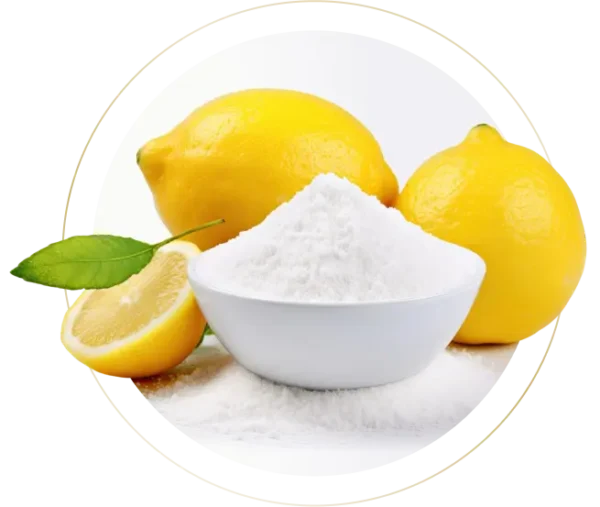
Bicarbonate
Bicarbonate, found in Hydrate as sodium bicarbonate and potassium bicarbonate, is the chief alkalizing substance your body uses to create an optimal pH. Research tells us that a diet rich in fruits and especially vegetables supplies most of our bicarbonate, but your body also creates its own bicarbonate as part of pH buffering. Unfortunately, our current diet and lifestyle patterns skew us toward acidic states that sometimes need outside assistance from supplemental bicarbonate [34].
Hydrate is the perfect way to introduce the extra bicarbonate you need not only for optimal pH but also for the added bonus of increased physical performance. Multiple studies have found benefits of bicarbonate for males and females and in many different forms of exercise, such as endurance, high-intensity training, and even hands-on activities such as karate or judo [32].
Citrate & Malate
Both citrate and malate, found in Hydrate as magnesium malate and potassium citrate, are technically known as anions. Your body transforms these compounds into alkalizing bicarbonate during the process of digestion [35]!
Along with Hydrate, you’ll find these anions in fruits and especially vegetables. On top of their ability to create an alkaline environment, they also support your body in maintaining adequate calcium stores and, thus, better bone health and less risk of detrimental fractures [36].
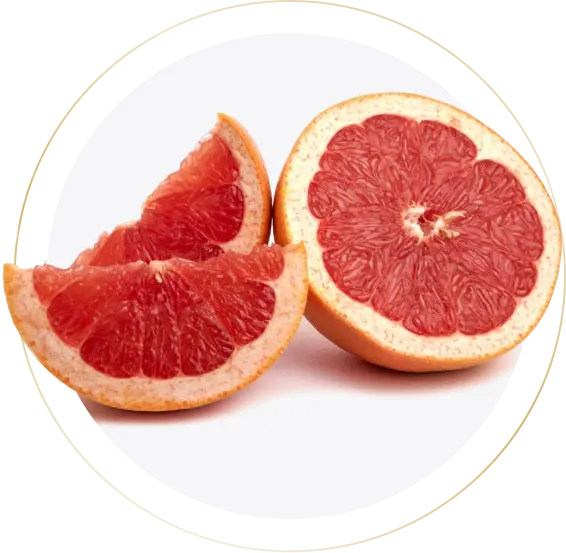

Potassium
Hydrate’s special mixture of potassium promotes pH balance in multiple ways—the alkalizing ions of potassium citrate, the direct buffering of potassium bicarbonate, and the powerful action of potassium itself.
The Longevity Power of Taurine
L-taurine is best known as a non-structural amino acid, but it plays crucial roles in optimal hydration due to its function as an osmoprotectant, meaning it guards against the negative effects of dehydration and electrolyte imbalance [37]. Additionally, it’s particularly beneficial to the heart, muscle tissue, and brain and is neuroprotective [38, 39].
But new research reveals that taurine slows or even reverses aging at the cellular, mitochondrial, and genetic levels, likely due to its role in combating oxidative stress, mitochondrial dysfunction, and cell deterioration and protection against telomerase deficiency, DNA damage, and inflammation [40, 41].
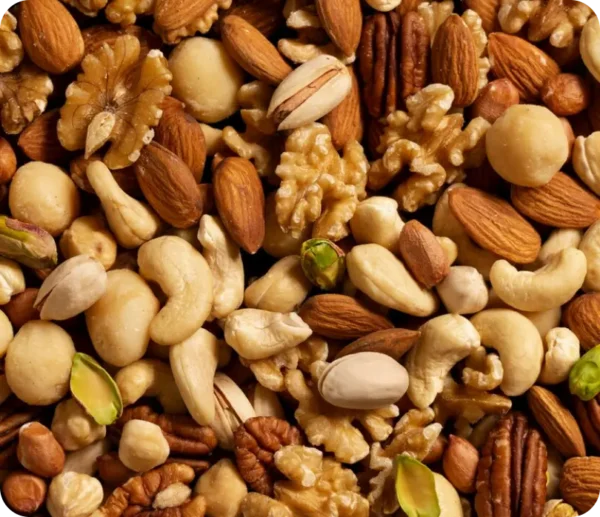

It’s even been shown to protect against skin aging (aka, wrinkles!) in animal models [42]
As one study succinctly stated,
“Taurine supplementation extends healthy lifespan.”
The 500 milligrams of taurine in each serving of Hydrate also supports digestive health, specifically the lining of the small intestine, as well as the balance of the gut microbiota and bile acid composition needed for optimal fat digestion [43, 44, 45].
Creatine... Not Just for Athletes
You probably think of creatine as a supplement just for athletes—that’s a common and unfortunate misconception!
Creatine monohydrate is the most extensively researched compound of all time. It’s a powerful sports supplement—for many athletes, it’s a highly effective performance aid as well as a promoter of lean body mass—but it’s also extremely useful for longevity and hydration.
Creatine is a hyper-hydrator that leads to greater fluid volume inside the cell. It may also help with thermoregulation, meaning that, in hot or humid environments, creatine allows the body to adapt to higher temperatures and avoid dehydration and heat illness [46, 47].

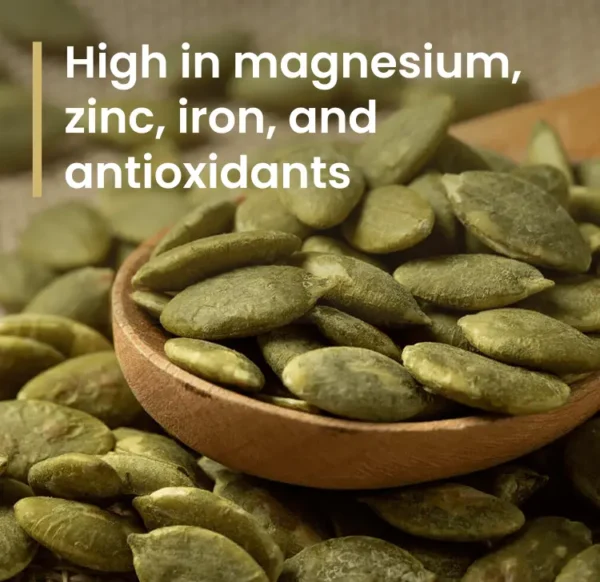
Along with this, creatine has been well-researched for its ability to help older adults maintain muscle mass and bone vitality. Studies show anti-inflammatory and anti-aging properties, along with a lower risk of falls with creatine use [48].
Creatine also has special neuroprotective qualities and is particularly supportive of brain and cognitive function. One study called it “more than a supplement for athletes” due to its ability to reduce mental fatigue, protect the brain from neurotoxicity, and even improve some neurological disorders like depression and bipolar disorder [49].
All in all, a master ingredient for hydration, performance, and longevity.
Fulvic Acid & Trace Minerals: Naturally-derived microminerals
Fulvic acid, a crucial element in humus, the nutrient-rich layer of the earth, is created by microbes breaking down plant matter. This compound combines with minerals to form a complex molecular compound. Termed ‘nature’s miracle molecule,’ fulvic acid activates soil nutrients for plant cell utilization, fostering strong and healthy growth.
Fulvic acid has recently risen in popularity as a supplement due to studies showing its usefulness in inflammatory conditions, skin disease, metabolic disorders, immune strengthening, wound healing, and digestive function [50].
Fulvic acid broadens the mineral profile you receive in each dose of Hydrate. Evidence also shows that it further enhances the absorption of key minerals into the cell.
This ingredient is strictly sourced from a pristine area of Northwest New Mexico and contains a thoroughly tested array of naturally occurring fulvic ionic macro and micro trace minerals and elements.


Skip the artificial fluorescent green-colored ”ades” for a hydration formula that PERFORMS
Replenishing minerals after a sweaty workout or sauna session keeps you feeling and thinking your best.
Any sports drink can provide a little extra sodium, potassium, and magnesium (and a LOT of food coloring, sugar, and added ingredients)…
But Hydrate isn't just any sports drink.
It offers extra minerals—in the forms and amounts that actually make a difference—along with science-backed, pH-balancing ingredients like taurine for anti-aging and cardio-protection, creatine for hyper-hydration, muscle-mass promotion, and more complete recovery, and potassium, citrate, malate, and sodium bicarbonate, for alkalized performance enhancement.
The mineral-rich, alkalizing water you create with Hydrate amplifies performance with…

Supercharged Hydration
Research shows that mineral-rich, alkalizing water provides hydration that supports your health and keeps you performing at the highest level. One such study of 38 people found that, over a four week period, ingestion of mineral-rich, high alkaline water led to a more favorable bodywide pH and improved hydration status compared to non-mineralized water [51].
Superior Performance
Cellular hydration and alkaline pH mean Hydrate is an essential part of your workout. Studies show that high mineral water leads to increased muscle and cardiovascular function, deters metabolic acidosis, and assists in better metabolic function, i.e., it promotes more efficient metabolism so your exercise is energized and you leave the gym feeling your best [52, 53, 54, 55, 56, 57].

Plus, we opted out of fluorescent food coloring and extra sugar for organic coconut water and naturally derived pomegranate, tangerine, and orange—great taste with no artificial anything.
Gatorade
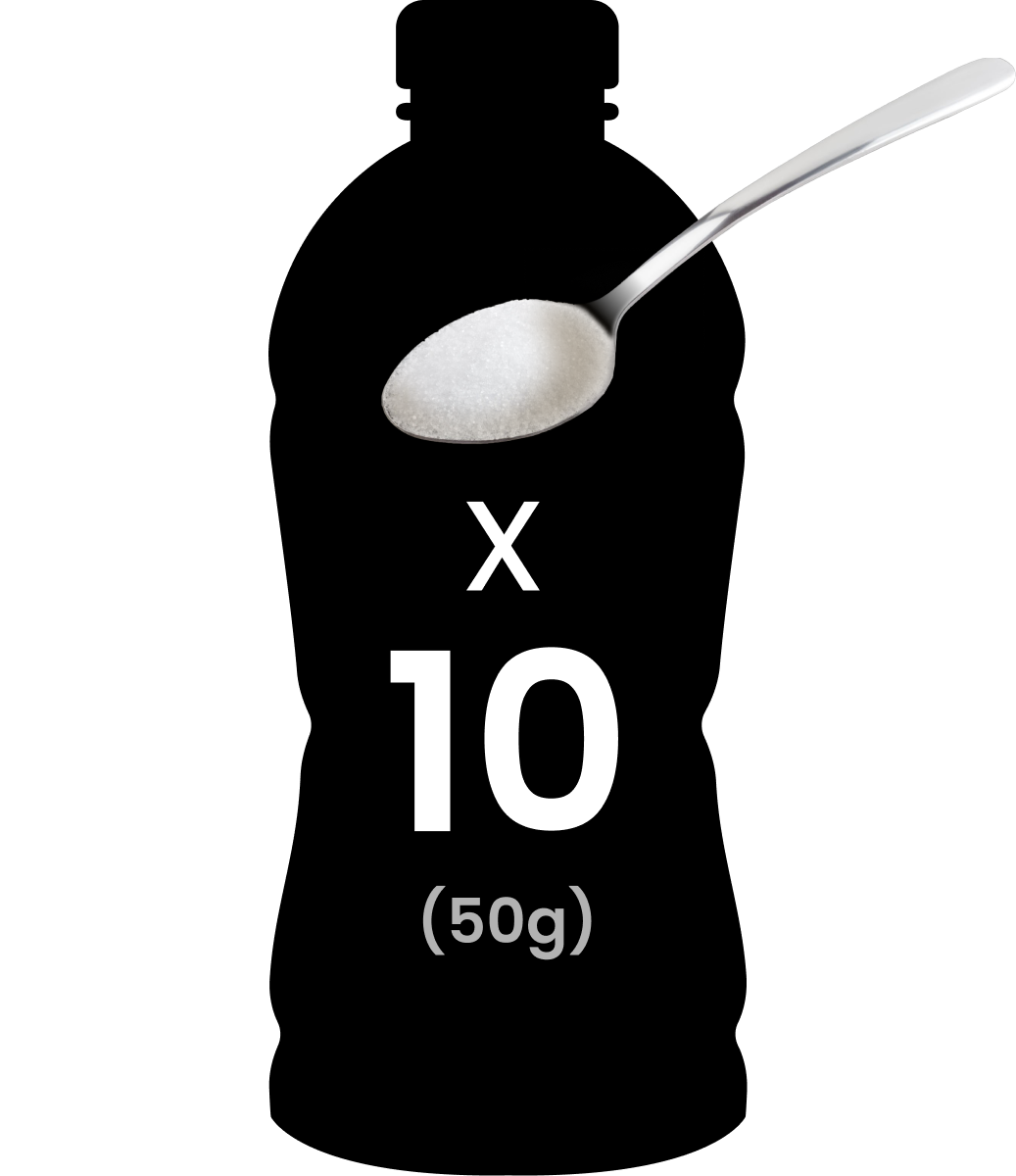
(50 grams of sugar per bottle!)
Cellular Hydration

(0 grams of sugar per bottle!)
Gatorade
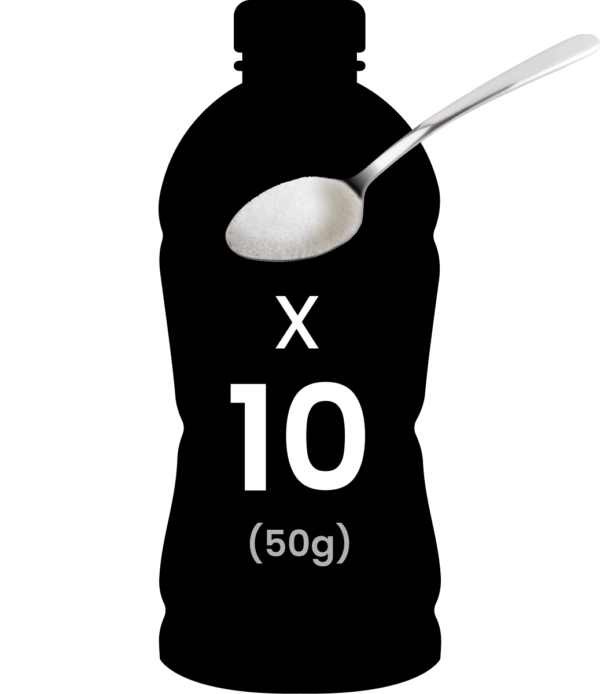
(50 grams of sugar per bottle!)

Cellular Hydration
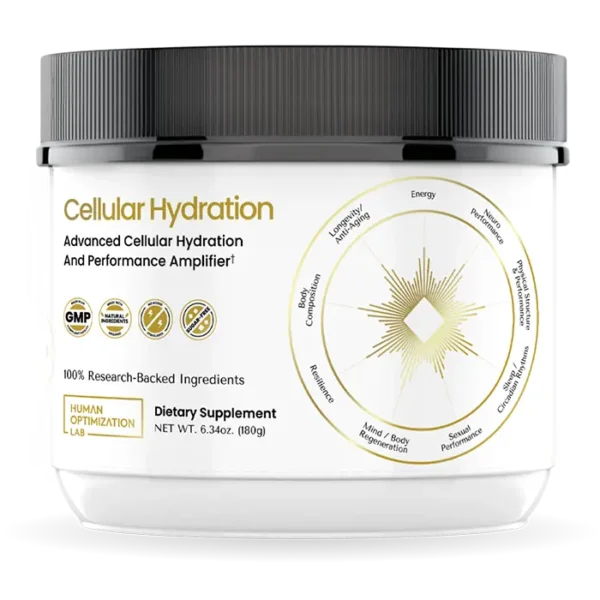
(0 gram of sugar per bottle!)
Full Transparency On The Label
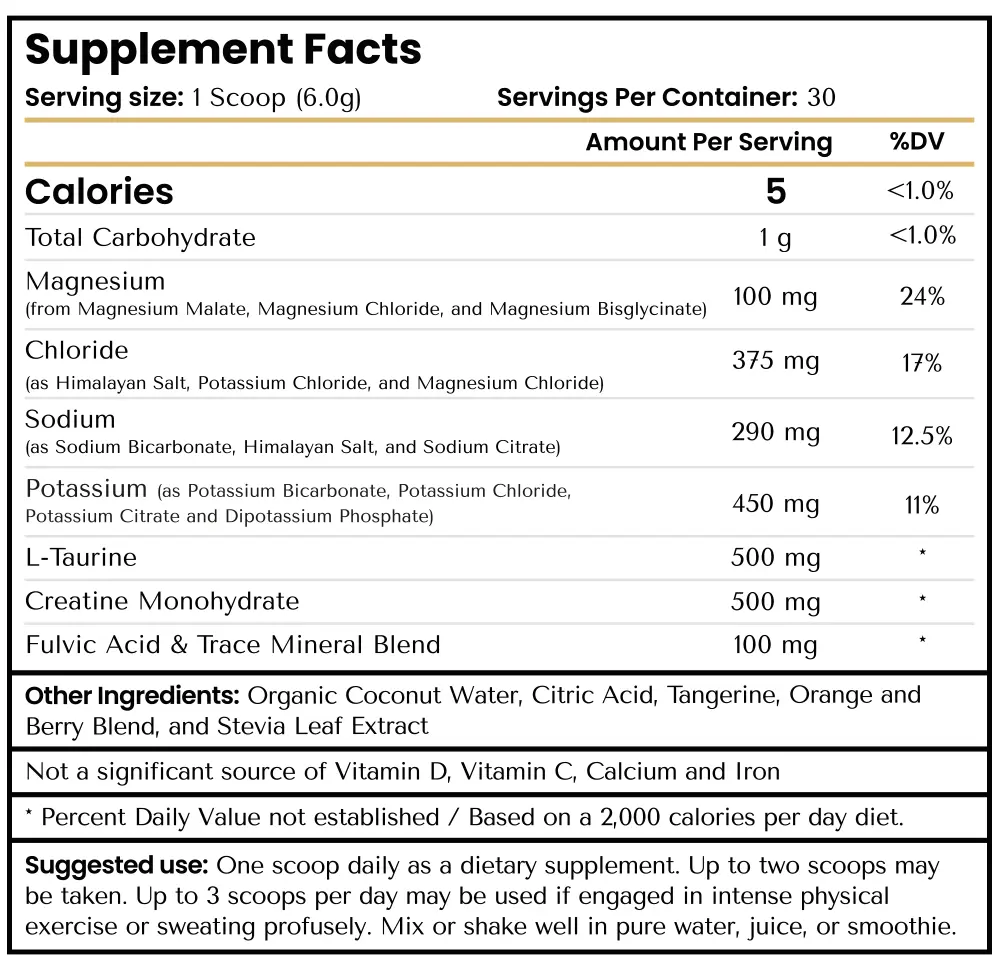
Buy Cellular Hydration Now
1 Month Supply
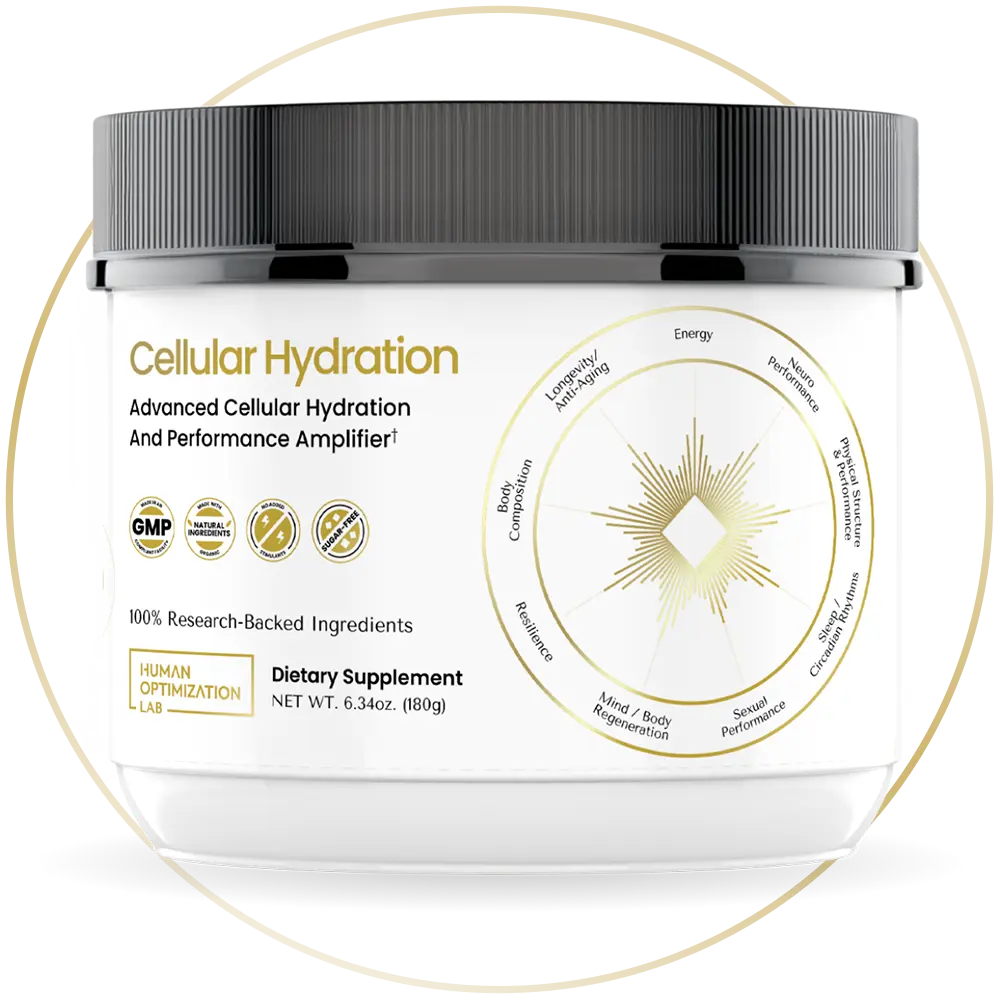
Cellular Hydration
$43.00
Worldwide Shipping (FREE Shipping within the U.S.)*
* For international orders: All shipments are shipped Duties, Customs, & Taxes unpaid. Buyer is responsible for delivery fees.
Subscribe & Save


Cellular Hydration
$43.00 $32.00
SAVE $11 Per ITEM
Worldwide Shipping (FREE Shipping within the U.S.)*
* For international orders: All shipments are shipped Duties, Customs, & Taxes unpaid. Buyer is responsible for delivery fees.
3 Month Supply
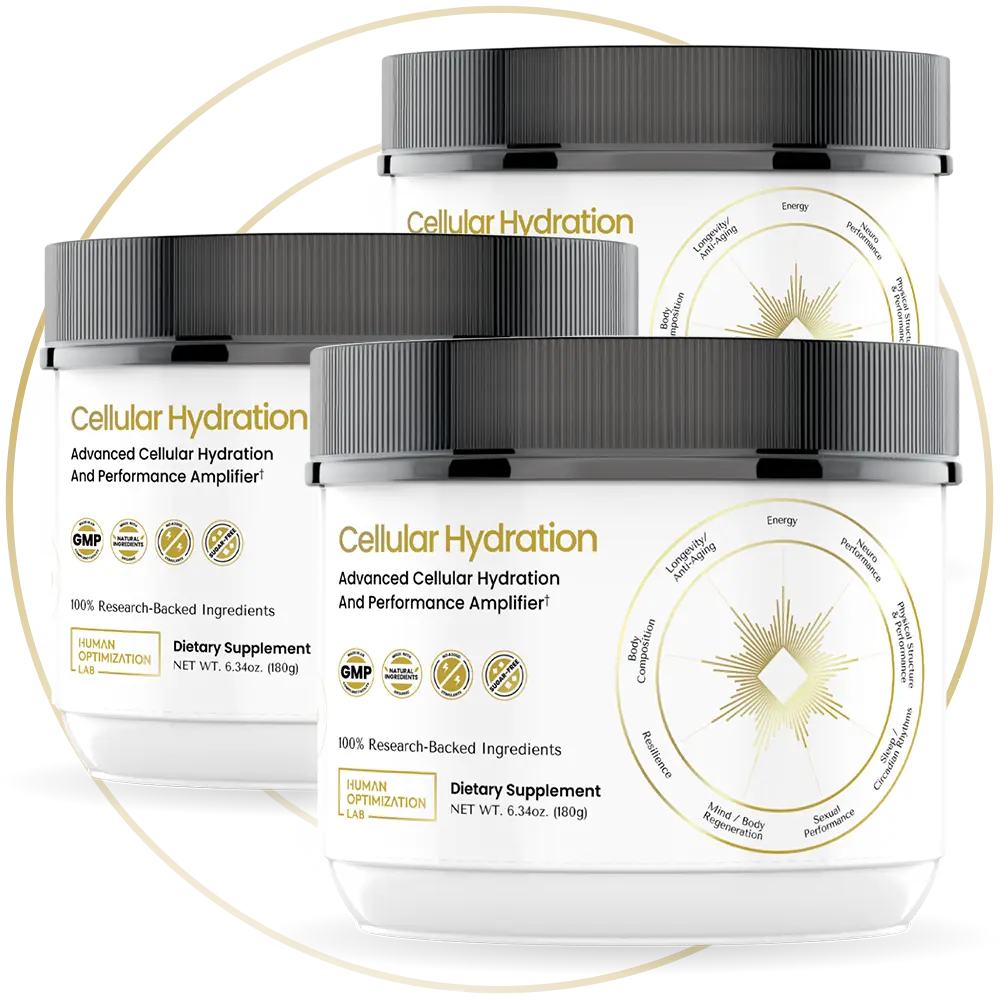
Cellular Hydration
$116.00
SAVE $4 Per ITEM
Worldwide Shipping (FREE Shipping within the U.S.)*
* For international orders: All shipments are shipped Duties, Customs, & Taxes unpaid. Buyer is responsible for delivery fees.
Worldwide Shipping (FREE Shipping within the U.S.)*
* For international orders: All shipments are shipped Duties, Customs, & Taxes unpaid. Buyer is responsible for delivery fees.
Buy Cellular Hydration Now
1 Month Supply

Cellular Hydration
$43.00 $32.25
Worldwide Shipping (FREE Shipping within the U.S.)*
* For international orders: All shipments are shipped Duties, Customs, & Taxes unpaid. Buyer is responsible for delivery fees.
Subscribe & Save


Cellular Hydration
$43.00 $27.95
SAVE $15 Per ITEM
Worldwide Shipping (FREE Shipping within the U.S.)*
* For international orders: All shipments are shipped Duties, Customs, & Taxes unpaid. Buyer is responsible for delivery fees.
3 Month Supply

Cellular Hydration
$129.00 $96.75
SAVE $4 Per ITEM
Worldwide Shipping (FREE Shipping within the U.S.)*
* For international orders: All shipments are shipped Duties, Customs, & Taxes unpaid. Buyer is responsible for delivery fees.
Worldwide Shipping (FREE Shipping within the U.S.)*
* For international orders: All shipments are shipped Duties, Customs, & Taxes unpaid. Buyer is responsible for delivery fees.
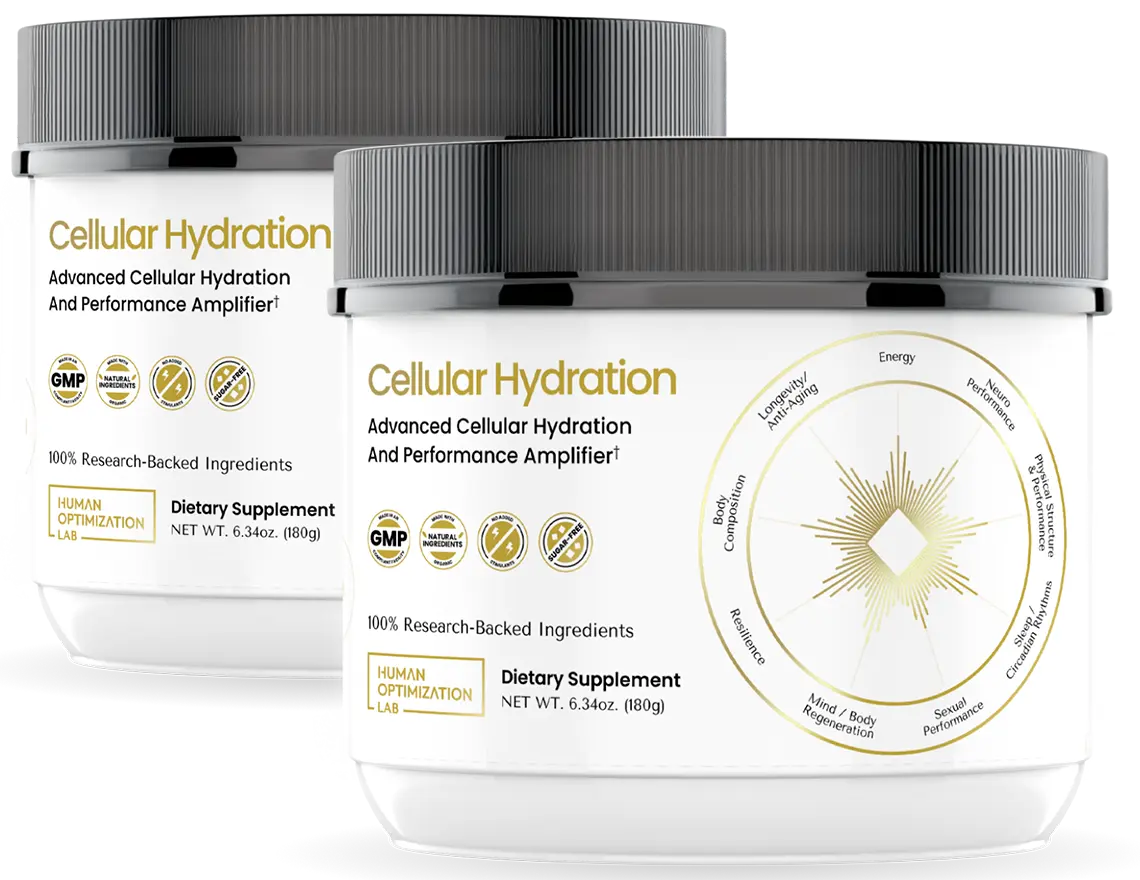
References
All References
*These statements have not been evaluated by the Food and Drug Administration. This product is not intended to diagnose, treat, cure, or prevent any disease.



